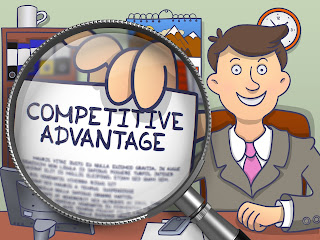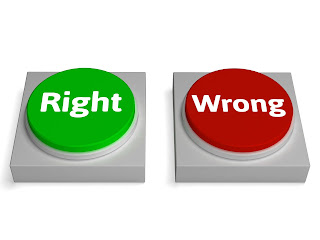In the short run, a team, organization, or other entity can lie, cheat, and manipulate its way to a competitive advantage.
But in the LONG run, the marketplace inevitably discovers liars, cheaters, and manipulators over time, and punishes them commensurately to their crimes—not necessarily in a court of law, but certainly in the court of public opinion and the buyer's guild.
As such, it makes sense to develop an organizational culture up front that values doing the right thing early and always. And it is in the interest of everyone in the organization to take positive pride in consistently following that pathway.
What does it mean to do the right thing?The answer to this question will almost certainly depend on who you ask. And in truth, the right thing or action will sometimes legitimately differ from person-to-person and from situation-to-situation based on reasonably differing preferences and priorities. Thus, "situational ethics" does have a place in the overall calculus of moral reasoning. As such, there are often "exceptions to the rule" (see SAL Theory Corollary 1.3).
However, without the aid of conscience and the guide of certain moral absolutes serving as immovable loadstars in moral matters, "situational ethics" can quickly become a slippery slope wending a person or organization down into the throes of moral entropy, organizational atrophy, and even financial failure.
So how does a person or organization balance the paradoxical (seemingly conflicting) reality and importance of both moral absolutes and situational ethics in one's life and career. That is a tricky question and is not always easy to answer. Nevertheless, Freedom Focused offers some core insights aimed at assisting any honest seeker of truth in the matter.
 |
| "Do what is right, let the consequence follow" (-Anon) |
Universal Laws, in-turn, are defined as:
"Natural laws that define reality and govern all naturally occurring forces throughout the universe (physical laws), as well as all long-term consequences of individual and organizational decisions (metaphysical laws)."
True principles help us determine what right actions are. They lead us to think, say, and do things that are RIGHT, while false principle lead us to say and do things that are WRONG. But what is the definition of "Right" and "wrong"?
Freedom Focused can help us in this regard as well, as follows:
RIGHT: Thoughts, speech, and actions that result in positive and constructive long-term consequences for self and others.
WRONG: Thoughts, speech, and actions that result in negative and destructive long-term consequences for self and others.
The KEY phrase in both of these definitions is, of course, "Long-Term."
At Freedom Focused, our agents take PRIDE in consistently doing the RIGHT things. And when we do something that is wrong (either individually or collectively) which we all do from time-to-time, we take action to remedy and rectify any negative consequences of our speech or actions and then immediately change course. Those are our social mores and corporate culture.
PRIDE is an interesting word. |
| Positive Pride in Achievement |
Pride can also have a negative connotation, as when a person pridefully rejects sound reason, good advice, or warning signs by proceeding to speak or act in ways that harm oneself or others.
Why do we as human beings exhibit negative pride when the results of doing so inevitably prove injurious? Probably the biggest reason is because we don't want to admit that we are misguided, naïve, or wrong. But what is so bad about admitting that we were misguided, naïve, or wrong... if we actually are?
Why does our pride sometimes get so caught up in being (seeming) right instead of figuring out what actually is right? Especially when pride can lead us down into disaster, destruction, and despair while humility can lead us to the promised land of whatever we are endeavoring to achieve?
I have learned from personal experience that if I am, in fact, wrong about something, it is infinitely easier to just admit to myself (and where necessary, others) this fact and then change course than it is to continue to pridefully pursue a flawed course and thereby have to endure the retinue of rueful regrets and consequences concomitant thereto.
It's worth noting here that my personal self-action leadership journey has been FULL of occasions when I was misguided, naïve, or wrong. In fact, there have been so many such times throughout my life and career that I can't even remember—much less count—them all! And I still have moments like that—and will until the day I die—a fact which helps keep me humble and reliant on the wise counsel, good advice, and sound direction of others' whose perspectives transcend my own in a given area or on a certain matter.
 |
| It takes courage to admit you were wrong, and then reach out to someone else for help. |
Why not take more pride in doing the right (and smart) thing instead of holding on desperately to some negative form of selfish pride simply for ego's sake? Why not courageously confront a moment or two of agonizing difficulty involved in admitting you were wrong, get it over with quickly, and then move on with the baggage behind you?
Those who courageously follow this pathway will discover that such moments aren't as bad as they thought they would be—and once it's over, you can move forward to a better, happier, and more confident and successful existence. In the end, this course offers a far bigger reward than its up-front price—however difficult that price may seem to be (or feel like) in the moment.
If I am smart, I will candidly and courageously confess whenever I am in error and then immediately begin to pursue the correct course. But in order to accomplish that sometimes difficult feat, I must exercise HUMILITY. And as we all know, it's not always easy to be humble.
What exactly is HUMILITY?
At Freedom Focused, we define it as: "The ability to accurately see and graciously acknowledge the way things really are based on physical and metaphysical realities rooted in Universal Laws."
That's a mouthful; but in essence, humility means doing the RIGHT thing whenever we see and recognize TRUTH, whether we feel like it or not. That is not an easy thing to do! As a result, nobody is perfectly humble. I certainly am not! But we can always keep trying to see things more clearly—as they really are (instead of the way we wish they were)—and for those who do, the rewards of humility are immense over time. Moreover, the seeming rewards of holding on to one's pride amount to a pathetic pittance by comparison.At Freedom Focused, we take pride in doing the right thing. We recognize that however justified a person may feel in one's prideful feelings, it is unwise to speak or act pridefully. Why? Because in the long run, it is YOU that is inevitably hurt the most by your own pride. Thus, self-action leaders recognize that reality and facts must often trump their feelings, no matter how powerful or important one's feelings may be. In other words, self-action leaders discern the great truth that feelings are often momentary, fleeting, and impulsive; but True Principles and Universal Laws are immovable, irrevocable, and incontrovertible. Thus, they allow principles and laws to become their guiding North Star, rather than their emotions alone.
 |
| The most successful organizations effectively balance sound laws with intentional & helpful mores |
"Pride goeth before destruction, and an haughty spirit before a fall.
— Proverbs
If you absolutely insist on being prideful, try to be prideful about one thing and one thing alone... Take Pride in Doing the Right Thing!
When a team or organization creates a culture that takes pride in doing the right thing, it actually becomes culturally shameful to do the wrong thing. And organizational or cultural mores that embrace consistently doing the right thing will prove more powerful and supportive than any formal rule, regulation, or punitive measure invoked by an authority figure. In the words of Èmile Durkheim, a French sociologist: "When mores are sufficient, laws are unnecessary; [but], when mores are insufficient, laws are unenforceable."
"When mores are sufficient, laws are unnecessary;— Èmile Durkheim
Wise leaders and managers spend most of their time and energy seeking to model and teach mores that value, reinforce, and reward TAKING PRIDE IN DOING THE RIGHT THING while discouraging and, when necessary, disciplining speech and behavior that embraces negative elements of pride. Creating such mores can prove time- and labor-intensive. But those who persist and succeed enjoy massive success and enormous satisfaction in their work in the long-run.
 |
| Be like Coach John Wooden... Take Pride in Doing the Right Thing |
What are you doing TODAY to teach and model TAKING PRIDE IN DOING THE RIGHT THING in your own relationships, family, team, organization, community, or nation?
.........................
Tune in NEXT Wednesday for another article on a Self-Action Leadership related topic.





No comments:
Post a Comment